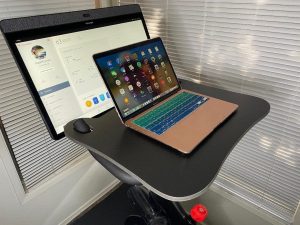Charge Your Devices While Pedaling Acer’s New Bike Desk

Do you know Charge Your Devices While Pedaling Acer’s New Bike Desk? As a device for multitaskers in a post-pandemic world, Taiwanese electronics giant Acer this week announced the Kinect, a “bike workstation” for folks who wish to work while riding their exercise machine. At this year’s Consumer Electronics Show (CES), in Las Vegas, Acer unveiled the eKinekt BD 3 bike desk, promoting it as a workstation and stationary bike for “sustainable and healthier lifestyles.”
As long as you keep working out, the eKinekt BD 3 bike desk uses the kinetic energy from your riding to power a generator, producing electrical energy.
According to Acer, an hour of continuous cycling at 60 RPM on the cycle desk may provide 75 watts of self-generated power
Read More:How to Start a Podcast the Right Way
That ought to be plenty to power both a laptop and a smartphone. There doesn’t appear to be a regular electrical plug on the desk, though. In its place, it has one USB-C port and two USB-A ports.
Charge Your Devices While Pedaling Acer’s New Bike Desk

When devices are charging, an LED on the bike’s rear will illuminate to indicate this. Acer claims that an hour of cycling at a moderate 60 RPM (revolutions per minute) can produce up to 75 watts of power. By converting that to kilowatt-hours and entering it into the EPA’s Greenhouse Gas Equivalencies Calculator, you may potentially save emissions by walking 0.132 miles rather than driving a gas-powered automobile (assuming you utilize those 75 watts for an hour).
As a result, there isn’t a lot of pollution averted or clean energy produced. In order to put things into perspective, the iPhone 13 Pro Max can take close to 30 watts from the wall when using a fast charger, and it can charge completely in under 90 minutes.
Two USB Type-A ports and one USB Type-C port on the Acer bike desk allow users to connect numerous devices at once; doing so can inspire a harder workout. The bike desk has two modes of operation: “Working” and “Sports”.
The rider can either slide the desktop further back to create space to lean forward and amplify the workout while sitting upright on the bike. For users who want to know how long they’ve been cycling, how many calories they burned, and how many watts they produced, it also comes with a smartphone app.
The desk comes with two modes.
According to Acer, when in working mode, the desk surface is moved closer to the chair so that riders can sit upright and type and pedal at the same time. In “Sports Mode,” the desktop is positioned farther front so that there is more room to lean in, simulating the position on a regular bike or trainer, which allows for more leg room and greater pedaling force.
Acer created a desk companion software that can display the number of calories expended combined with the amount of electricity generated in order to keep the user engaged. On a built-in LCD monitor, exercise statistics will also be displayed.
According to the Taiwanese company, one of the significant improvements is that the desk converts the kinetic energy from cycling into an electrical charge to power electronic devices like laptops or smartphones.
In the work mode, the desk is brought closer to the seat, making it more comfortable for riders to sit while working and cycling. According to the manufacturer, using the sport model enables the machine to operate more like a typical exercise bike. Acer did not specify a precise launch date or the regions in which it will be offered.
The launch of the new product coincides with the end of Covid limitations, which lasted three years and saw the adoption of hybrid working arrangements by numerous businesses throughout the globe.
But now that even China has reopened, more businesses are urging their workers to return to work, which could hurt sales of the recently announced bike desk.
The computer manufacturer should at least produce a fun-riding bike for the Kinect BD 3. It will cost $999 when it debuts in North America in June, so it is undoubtedly an expensive ride. According to Acer, the bike desk will also be accessible in Taiwan in April and in June across Europe, the Middle East, and Africa.
Without spending as much money, you might be able to test out similar devices, known as “WeBike” bicycle desks at rail stations and airports. They have at least been scattered throughout Europe since 2014.











